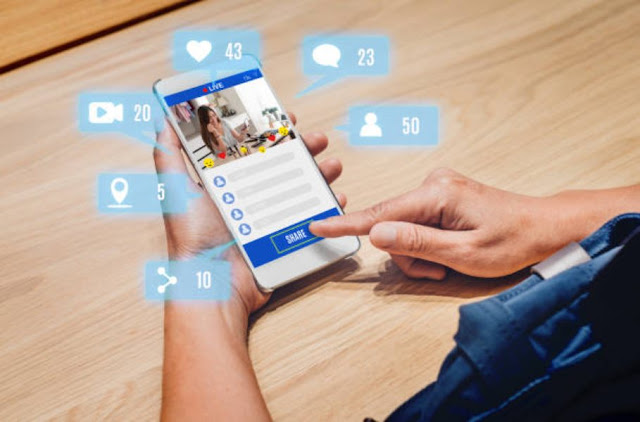Digital Beauty and Social Media

Digital Beauty and Social Media: The Intersection of Technology and Business
The convergence of digital beauty and social media has
ushered in a new era of innovation and transformation within the beauty
industry. This dynamic partnership not only impacts the way beauty products are
marketed and sold but also influences consumer behavior, business strategies,
and technological advancements. This article explores the intricate
relationship between digital beauty, social media, technology, and business.
Digital Beauty: A Technological Evolution
Digital beauty refers to the integration of technology and
beauty, where digital platforms, tools, and innovations enhance the beauty
experience. This encompasses a wide range of applications, from augmented
reality (AR) try-ons of makeup products to virtual skincare consultations
powered by artificial intelligence (AI). Digital beauty revolutionizes how
consumers interact with beauty brands and products.
Social Media's Role in Digital Beauty
Social media platforms serve as the perfect canvas for the
expression and exploration of digital beauty. Platforms like Instagram, TikTok,
and YouTube have become hubs for beauty influencers, brands, and consumers to
share, discover, and discuss beauty trends, tips, and products. Social media
facilitates real-time engagement, allowing consumers to see and experience
digital beauty firsthand through videos, tutorials, and interactive content.
Business Transformation: Brand Engagement and Sales
The partnership between digital beauty and social media has
transformed the beauty industry's business landscape. Brands now utilize social
media to showcase their products in innovative ways, leveraging AR filters and
virtual try-ons to engage consumers. These digital experiences allow consumers
to visualize how products will look on them, bridging the gap between online
shopping and in-store try-ons.
Moreover, social media has democratized brand exposure,
allowing emerging beauty brands to gain traction and visibility on a global
scale. Influencers and beauty enthusiasts use social media to endorse products,
creating a ripple effect that can propel a brand's growth and success. This has
disrupted traditional marketing channels, offering businesses a direct line to
their target audiences.
Consumer Empowerment and Engagement
Digital beauty on social media empowers consumers by
enabling them to take charge of their beauty choices. Interactive features like
AR try-ons and virtual consultations allow consumers to experiment with
different looks and receive personalized recommendations. This engagement
fosters a sense of involvement and ownership, enhancing the consumer's
relationship with the brand.
Social media also facilitates real-time communication
between brands and consumers, creating a feedback loop that drives innovation.
Brands can gather insights, understand consumer preferences, and swiftly adapt
to changing trends. This agile approach to product development and marketing
sets the stage for consumer-centric business strategies.
Technological Innovation: AR, AI, and Beyond
The collaboration between digital beauty and social media
has spurred technological innovation within the beauty industry. AR technology
allows users to virtually try on makeup, experiment with hair colors, and
visualize cosmetic procedures. AI-powered tools offer personalized skincare
recommendations, revolutionizing skincare routines. As these technologies
continue to evolve, they push the boundaries of what is possible in the beauty
realm.
The integration of AI algorithms into social media also enables
targeted advertising and personalized content delivery. These algorithms
analyze user preferences, behavior, and engagement patterns to deliver tailored
beauty content and product recommendations. This hyper-personalization enhances
the user experience and drives conversion rates for businesses.
Challenges and Ethical Considerations
While the partnership between digital beauty and social
media offers immense potential, it also poses challenges. The idealized images
and filtered content often found on social media can contribute to unrealistic
beauty standards. Brands and influencers have a responsibility to promote
authenticity, diversity, and body positivity to ensure a positive impact on
consumer perceptions.
Additionally, data privacy and ethical considerations arise
when collecting and using consumer data for personalized recommendations.
Striking a balance between enhancing the consumer experience and respecting
data privacy is vital.
Collaborative Innovation: Shaping the Future
The future of digital beauty and social media hinges on
collaborative innovation. Brands, influencers, technology developers, and
ethical experts must work together to create responsible digital beauty
experiences. Ensuring inclusivity, authenticity, and data privacy will pave the
way for meaningful and impactful interactions between consumers and beauty
brands.
Conclusion
The convergence of digital beauty and social media is a
testament to the power of technology and its transformative influence on the
beauty industry. This partnership has revolutionized the way beauty products
are marketed, sold, and experienced. It empowers consumers, transforms business
strategies, and drives technological innovation, shaping a future where beauty
is not just a product but a dynamic and immersive experience. As technology
continues to evolve, the collaboration between digital beauty and social media
will further bridge the gap between the virtual and physical realms, enhancing
the beauty journey for all.



Comments
Post a Comment